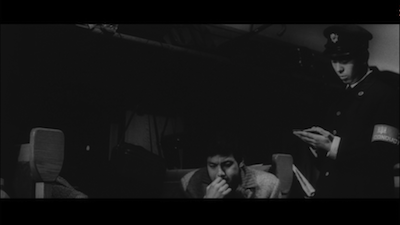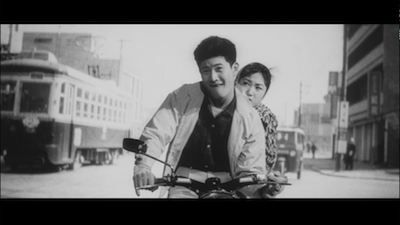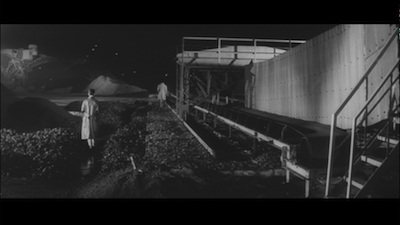Rusty Knife is a 1958 crime drama from director Toshio Masuda, who later worked on the Japanese sequences in Tora! Tora! Tora! and is probably best known for helming a good portion of the early Space Battleship Yamato anime. Masuda shot Rusty Knife from a script by Shintarô Ishihara, the author of the story Shinoda's Pale Flower [review] was adapted from. While Rusty Knife doesn't have the complexity of that later film, it does have a similar doomed view of romance and isn't shy about the darkness that permeates the criminal underworld.
and is probably best known for helming a good portion of the early Space Battleship Yamato anime. Masuda shot Rusty Knife from a script by Shintarô Ishihara, the author of the story Shinoda's Pale Flower [review] was adapted from. While Rusty Knife doesn't have the complexity of that later film, it does have a similar doomed view of romance and isn't shy about the darkness that permeates the criminal underworld.
Set in an industrial town that emerged in the Udaka District after the war, Rusty Knife tackles the problem of prosecuting organized crime when the bad guys have created a perpetual state of fear in the common populace. Seiji Katsumata (Naoki Sugiura) is a thorn in the side of prosecuting attorney Karita (Shoji Yasui). Every time Karita gets his hands on Katsumata, witnesses disappear. That is if they come forward at all. After the crook dodges an assault charge, Karita thinks his luck is turning around. An anonymous letter shows up at his office claiming to be from one of three witnesses to the murder of a councilman five years earlier.
Karita's hopes that this confession isn't just another attempt to shake Katsumata down for hush money are dashed when the letter's author (a young Joe Shishido, whose cheeks weren't yet as pronounced as they would eventually become) is found dead. Luckily, the dead man sent a second letter and this time not only signed his name, but named the other two witnesses. Tachibana (Yujiro Ishihara, I Hate But Love [review]) runs a bar now, and his co-conspirator, Terada (Akira Kobayashi), works under him. Tachibana is attempting to go straight after spending five years in jail for killing a man who raped his girlfriend (who then killed herself). When both Katsumata and Karita come calling, he wants nothing to do with either. He wants no further trouble until he can move to Tokyo and start over where no one knows him.
Tachibana is a classic noir hero. His past haunts him, and his present situation pushes him to do the right thing even though it's dangerous. Terada takes a new bribe and gets into trouble with the gangsters, forcing Tachibana's hand. At the same time, the deceased politician's daughter, Keika (Mie Kitahara, who is also Yujiro Ishihara's co-star in I Am Waiting [review]) is pressuring him to come clean so her father's killers can be punished. Both she and Karita believe that if Tachibana takes a stand, the rest of the town will see it's possible to do their civic duty and follow suit.
For his part, Tachibana fears he will lose control again and do someone else harm. This becomes less of a concern when he learns that the man he killed was not alone in violating his beloved, nor is Katsumata the top of the food chain. The criminal misdeeds go deeper than anyone realized. The rusty knife of the title is the one that Tachibana used for his revenge, and his taking it out of its hiding place signals an existential shift for him. To cleanse himself of the blood of the past, he must spill more. In doing so, he may offset the feeling of futility he now has for wasting away in prison for murdering the wrong man.
Rusty Knife is a fairly straightforward crime movie. Masuda displays little flair in his framing. Realistic sets and location shooting give the movie a tough, down-to-earth look. Masuda reserves the best location for the film's climax, using a rocky railyard to serve as both a symbol of how the violence is born of man's most prehistoric urges and Tachibana's desire to move on. This sequence is brutal in its simplicity, contrasting nicely with Rusty Knife's other big action piece. When it's decided that it would be better to kill Terada instead of paying him more money, Katsumata kidnaps him, leading to a long pursuit in the streets. Both Tachibana and Katsumata drive large trucks--not the normal mode of transport for a car chase. These trucks are bigger, blockier, and clumsier, and thus more deadly in their own way. When Tachibana finally runs the bad guys down, he and Katsumata have a drawn-out fist fight that just keeps going and going and going. By comparison, the rape of Tachibana's girlfriend is shown in only a brief, impressionistic montage. The world Rusty Knife portrays may be vicious, but that doesn't mean Masuda can't be tasteful.
Yujiro Ishihara is excellent as the troubled hero. His performance starts quiet, as the character attempts to stay unnoticed and unbothered. The slow boil is effective, making for a convincing transformation into a man of action. Akira Kobayashi is also quite good as Tachibana's twitchy cohort, playing the role as if he were a teenaged younger brother trying to emerge from the shadow of his more popular elder sibling. On the other side of the equation, Naoki Sugiura is menacing as the jovial bully. His cold laughter is creepy, and the actor pulls off Rusty Knife's most memorable scene. I won't give too much away, but let's say it involves stuffing his mouth full of pastries in the police station.
In the endless sea of crime films, Rusty Knife doesn't do a ton to distinguish itself, but it is a serviceable genre exercise. It fits in nicely with the other entries in the Nikkatsu Noir boxed set, providing dependable support to some of the better-known efforts by bigger-named directors. Call it a B+ B-movie.








No comments:
Post a Comment